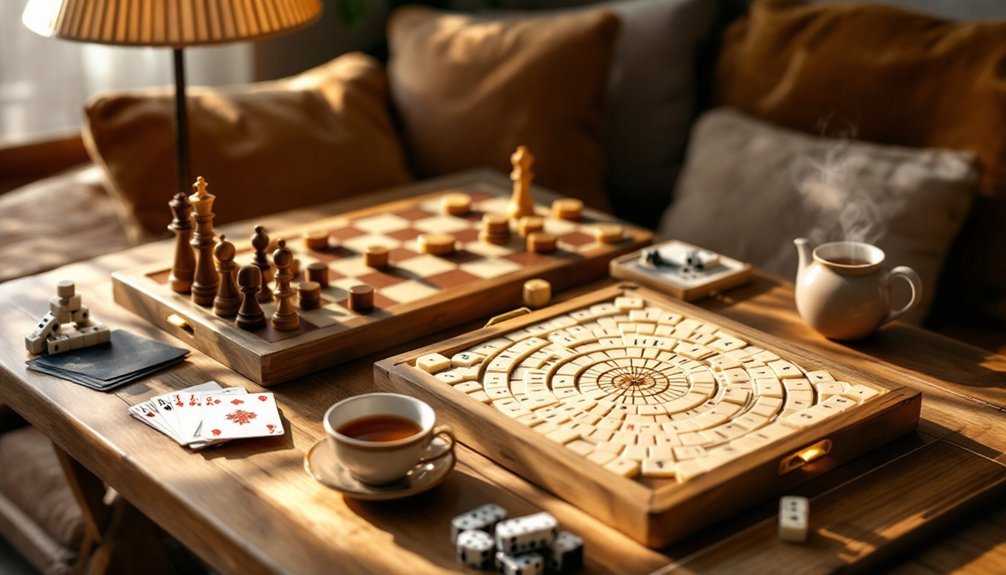You've probably experienced those game nights that leave everyone feeling more stressed than when they started. It doesn't have to be that way. Today's strategy board games are shifting toward experiences that challenge your mind while maintaining a peaceful atmosphere. Whether you're managing anxiety, teaching emotional skills to children, or simply seeking a more relaxed gaming experience, these seven carefully selected games will transform your next family gathering into a mindful adventure.
Oversight 4 in a Row Family Strategy Board Game
Three distinct features make the Oversight 4 in a Row Family Strategy Board Game perfect for parents seeking a calming yet engaging activity for their children. First, you'll appreciate its thoughtful STEM-based design that encourages logical thinking without creating stress. Second, the dynamic board lets you place or shift rows, offering a gentler pace than traditional strategy games. Third, the gameplay adapts to up to four players, making it ideal for peaceful family nights.
While there's a learning curve for younger players, this reimagined version of the classic four-in-a-row concept provides a soothing alternative to high-energy games, especially suitable for ages 8-12.
Best For: Families with children aged 8-12 seeking a calm, educational strategy game that combines STEM learning with interactive gameplay.
Pros:
- Promotes logical thinking and problem-solving skills through STEM-based design
- Accommodates up to four players, making it great for family game nights
- Dynamic board mechanics add an interesting twist to traditional four-in-a-row games
Cons:
- Steep learning curve may frustrate younger players
- Lower popularity ranking (#797,991 in Toys & Games) suggests limited market presence
- Some concerns about game board design and material quality
Buffalo Games Tetris Strategic Puzzle Game
The Buffalo Games Tetris Strategic Puzzle Game offers a perfect entry point for families seeking a calming yet engaging tabletop experience. You'll find the familiar mechanics of rotating and dropping tetrimino pieces, now transformed into a strategic multiplayer format that accommodates 2-4 players.
With a manageable 20-30 minute playtime, you can unwind while planning your moves and scoring points through completed lines and achievement cards. The game's accessibility makes it ideal for ages 8 and up, though even younger players can join in. Despite occasional challenges with piece storage and tower placement, you'll appreciate the quality components and versatile gameplay modes that keep everyone entertained.
Best For: Families and friend groups looking for a strategic yet accessible board game that captures the classic Tetris experience while promoting social interaction.
Pros:
- Easy to learn mechanics that build on familiar Tetris gameplay while adding new strategic elements
- Accommodates multiple players (2-4) with quick 20-30 minute rounds perfect for game nights
- High replay value with various game modes and achievement cards keeping sessions fresh
Cons:
- Small pieces can be easily lost without careful organization and storage
- Initial setup may be confusing for new players without watching tutorial videos
- Pieces occasionally get stuck in the tower, requiring careful handling during gameplay
Mindfulness Therapy Card Game for Social Skills & Self Care
Professional therapists and educators will find the Mindfulness Therapy Card Game an invaluable tool for teaching social skills and self-care practices. With 50 expertly designed cards spanning five categories, including True/False, Mindful Practices, Visualizations, Social Skills, and Self Care, this game effectively promotes mental wellness and personal growth.
You'll appreciate the game's versatility, as it's suitable for players of all ages and can accommodate up to five participants in group settings. The sturdy, large-format cards guarantee durability through repeated use. Whether you're a mental health professional, teacher, or parent, you'll discover that this thoughtfully crafted game helps players express feelings, improve focus, and develop essential life skills.
Best For: Mental health professionals, educators, and parents seeking an engaging tool to teach mindfulness, social skills, and self-care to groups of children, teens, or adults.
Pros:
- Versatile design accommodates multiple age groups and can be used in various settings (therapy, classroom, home)
- Comprehensive coverage of important topics through 5 different card categories
- Durable, large-format cards ensure longevity and easy handling during group sessions
Cons:
- Limited to 5 players maximum, which may not work for larger group settings
- May require professional guidance to maximize therapeutic benefits
- Could be challenging to maintain engagement with mixed age groups simultaneously
Emotional Rollercoaster Anger Management Board Game for Kids
Designed for children ages 4-12, Emotional Rollercoaster offers a therapeutic approach to managing anger through engaging gameplay. This board game, similar to Chutes and Ladders, helps kids explore their emotions while learning valuable coping strategies.
You'll find mindfulness exercises and breathing techniques that teach children how to stay grounded when facing big feelings. It's particularly useful for parents and teachers working with children on the autism spectrum or those struggling with emotional dysregulation.
While some users note concerns about the game's physical quality, its therapeutic value shines through in play therapy sessions, making it an effective tool for developing emotional intelligence and communication skills.
Best For: Children ages 4-12 who need support with emotional regulation, particularly those with autism or experiencing difficulty managing anger and big feelings.
Pros:
- Incorporates practical coping strategies like mindfulness and breathing exercises
- Effective therapeutic tool for both home and clinical settings
- Engaging format makes learning emotional management skills fun and interactive
Cons:
- Issues with physical quality and durability of game components
- Grammar errors present on some game cards
- Game board size may be smaller than expected
Head Rush Social Skills Card Game for Mindfulness and Communication
Built specifically for fostering meaningful conversations, Head Rush serves as an engaging mindfulness card game that'll help you develop better social skills and emotional awareness. With 108 cards designed by Therapy U, this fast-action game encourages self-reflection and honest communication among players ages 12 and up.
You'll find it particularly useful in group settings, whether you're a teacher, counselor, or someone looking to strengthen bonds with family and friends. While the competitive element adds excitement, the game's true value lies in its ability to break down barriers and facilitate open dialogue. Made in the USA, Head Rush comes with a satisfaction guarantee, making it a reliable choice for your next meaningful game night.
Best For: Teachers, counselors, therapists, and families seeking to facilitate meaningful conversations and develop social skills with groups of teens and adults.
Pros:
- Effectively promotes self-reflection and open dialogue through engaging card-based gameplay
- Versatile tool for various settings including therapy sessions, classrooms, and family gatherings
- Comes with quality assurance and money-back guarantee from a reputable USA manufacturer
Cons:
- Game mechanics can be complex and may require additional explanation
- Questions may become repetitive after multiple play sessions
- Minimum age requirement of 12+ limits use with younger children
PTS Games Impulsive Eddie: The Fun Impulse Control Game for Kids
This engaging card game delivers essential impulse control lessons through its lovable canine character, Eddie, making it particularly valuable for children ages 8-12 who struggle with ADHD or impulsivity.
You'll find 108 cards in total, including 88 question cards and 20 fun Eddie cards that create an interactive experience for 2-6 players. The 20-minute gameplay promotes healthy competition while teaching critical self-control skills. While some players note the rules can be complex, you can easily adapt them to fit your needs.
The game's portability makes it perfect for therapists, teachers, and parents on the go. Plus, you'll get access to bonus digital content featuring helpful tips and printable worksheets.
Best For: Children ages 8-12 struggling with ADHD, impulse control, or self-regulation issues, as well as the parents, teachers, and therapists who work with them.
Pros:
- Engaging gameplay with a relatable dog character that helps children externalize and understand impulse control
- Includes additional digital resources with tips and printable worksheets for extended learning
- Portable design and 20-minute gameplay make it practical for various settings and attention spans
Cons:
- Game rules can be complicated and may need modification for some children
- Cards can become repetitive after multiple play sessions
- Limited to 2-6 players, which may not work for larger group settings
Stop, Relax & Think Game for Impulsive Children
Active, impulsive children between ages 6-12 will discover valuable self-control strategies through the "Stop, Relax & Think" board game, which serves as both an entertaining and therapeutic tool.
You'll find various card decks covering essential topics like grief, divorce, and conflict resolution, making it versatile for different therapeutic needs. The game accommodates up to six players and helps children develop motor control, relaxation skills, and problem-solving abilities.
While therapists and school counselors praise its effectiveness in facilitating meaningful discussions, you might need to adapt the rules for younger players. Though some parents consider it pricey, the game's blend of fun and educational value makes it a worthwhile investment for promoting emotional expression and impulse control.
Best For: Therapists, school counselors, and parents working with impulsive children ages 6-12 who need help developing self-control and emotional expression skills.
Pros:
- Effectively combines therapeutic benefits with engaging gameplay, making it an enjoyable learning experience
- Versatile card decks cover multiple topics like grief, divorce, and conflict resolution
- Facilitates meaningful discussions and helps children develop important emotional and behavioral skills
Cons:
- Higher price point may be prohibitive for some buyers
- Content may be too advanced for younger children or those with limited comprehension
- Additional guidance or rule modifications may be needed for younger players
Factors to Consider When Choosing the Most Calming Strategy Board Games
When you're selecting calming strategy board games, you'll need to evaluate several key factors to guarantee the best fit for your needs. Consider age-appropriate difficulty levels, player count, and play duration to match your group's capabilities and time constraints. You'll also want to check that the game offers a balanced mental challenge and includes clear, easy-to-follow instructions to prevent frustration during gameplay.
Age-Appropriate Difficulty Level
Selecting calming strategy board games with appropriate difficulty levels plays an essential role in creating an engaging and stress-free gaming experience.
You'll want to carefully match the game's complexity to your players' ages and abilities. For younger children, choose games with straightforward mechanics that won't overwhelm them, while older players will benefit from more strategic elements that challenge their thinking. Check the recommended age range on the box, but don't rely on it exclusively – also consider player feedback about the game's actual difficulty level.
Pay attention to the learning curve; if it's too steep, players might become frustrated, but if it's too shallow, they'll quickly lose interest. Look for games that promote cognitive development and emotional regulation while maintaining an appropriate challenge level for your intended age group.
Number of Players
The number of players supported by a strategy board game can greatly impact its calming effects. When choosing a game, you'll want to take into account whether you prefer the intimate focus of a 2-player experience or the social dynamics of a larger group setting.
Games designed for 2-4 players often provide a more serene atmosphere, allowing you to take your time with decisions and maintain a peaceful pace. These smaller player counts are ideal if you're seeking a quieter, more contemplative experience. However, if you find comfort in group interactions, games that support 5-6 players can create a supportive environment through cooperative play and shared experiences. They're particularly effective for anxious players who benefit from positive social engagement.
Remember that there's no one-size-fits-all solution – choose based on your group's comfort level and preferences.
Play Duration Time
Along with choosing the right player count, understanding play duration helps create an ideal calming experience. You'll want to look for strategy board games that last between 20 to 30 minutes, as this sweet spot allows you to remain engaged without feeling overwhelmed or fatigued.
When selecting your game, consider how shorter playtimes can actually enhance your focus and keep everyone interested. You'll find that brief sessions let you play multiple rounds if you're enjoying the experience, but don't lock you into lengthy commitments that might create stress. Look for games that offer flexible duration options, as they'll accommodate different energy levels and attention spans within your group. This adaptability guarantees everyone can maintain their calm state while fully enjoying the strategic elements of the game.
Mental Challenge Balance
Finding the right mental challenge balance in strategy board games is essential for maintaining a calming atmosphere while keeping players engaged. You'll want to choose games that offer enough complexity to stimulate critical thinking without causing stress or frustration.
Look for games that combine logical problem-solving with accessible gameplay mechanics, ensuring all players can participate meaningfully. If you're selecting games for ages 7-15, consider options that provide room for growth while remaining manageable for younger participants. The best calming strategy games encourage strategic planning without creating high-pressure situations.
You'll also benefit from games that foster natural player interaction and feature evolving gameplay elements. This combination helps create a relaxed social environment where players can focus on developing their strategies while enjoying each other's company.
Clear Instructions Required
Building upon the mental challenge balance, a game's instruction clarity plays a fundamental role in creating a peaceful gaming environment. You'll want to look for games with straightforward, well-structured rules that you can quickly understand and teach to others.
When selecting a calming strategy game, prioritize those with clear, concise instructions that don't leave room for confusion. You'll find that games with simple guidelines allow players to focus on strategic thinking rather than constantly referring back to the rulebook. This is especially important if you're playing with younger participants or introducing new players to the game.
Clear instructions also mean you'll spend less time on setup and more time enjoying the actual gameplay, which helps maintain a relaxing atmosphere throughout your gaming session.
Quality of Game Materials
Material quality stands at the forefront of creating a soothing gaming experience. When selecting a calming strategy board game, you'll want to guarantee it's built with durable, high-quality components that won't break or deteriorate during repeated play sessions. Look for sturdy cards that won't bend easily, well-constructed boards that lay flat, and pieces that feel substantial in your hands.
Pay attention to the materials' safety, especially if you're playing with children, by choosing games made with non-toxic components. You'll also benefit from games that include thoughtful storage solutions, like compartmentalized boxes or storage bags, which help maintain organization and prevent lost pieces. Quality components not only enhance your gameplay experience but also reduce frustration that could disrupt your peaceful gaming atmosphere.
Therapeutic Learning Elements
When selecting calming strategy board games, therapeutic learning elements play a vital role in promoting mental well-being and emotional growth. Look for games that incorporate mindfulness practices and structured activities designed to enhance your emotional regulation and self-awareness.
You'll want to choose games that teach valuable social skills and coping strategies through interactive gameplay. These games should encourage communication and collaboration while providing opportunities to explore feelings in a safe, supportive environment. The best therapeutic board games include turn-taking mechanics and problem-solving elements that help you develop self-control and improve impulse management.
Pay attention to games that prompt reflection on your actions and emotions. These features create meaningful learning experiences that go beyond simple entertainment, helping you build stronger relationships and enhance your emotional intelligence through engaging play.
Frequently Asked Questions
Can These Games Help With Clinical Anxiety or Depression?
While board games can provide temporary relief and positive distraction, they're not a substitute for professional treatment of clinical anxiety or depression. You'll get best results combining them with proper medical care.
What Age Is Too Old to Benefit From Calming Strategy Games?
You're never too old to benefit from calming strategy games. They'll help sharpen your mind and reduce stress at any age. Research shows seniors especially gain cognitive benefits from regular gaming activities.
How Long Should Each Gaming Session Last for Maximum Calming Effects?
You'll get the best calming effects from 30-60 minute gaming sessions. If you're feeling stressed, don't push beyond 90 minutes, as longer sessions might reverse the relaxing benefits you're seeking.
Are These Games Effective for Individuals With Attention Deficit Disorders?
You'll find many calming strategy games helpful for ADHD, as they provide structured focus and engagement. They can improve your concentration, but it's best to start with shorter games and gradually increase playtime.
Can Calming Strategy Games Be Played Competitively in Tournaments?
You'll find many calming strategy games featured in competitive tournaments. While they're designed for relaxation, games like Chess, Go, and Catan maintain their strategic depth and are popular in organized competitive events.
In Summary
Whether you're seeking a peaceful family game night or therapeutic play sessions, these calming strategy board games offer the perfect balance of engagement and tranquility. You'll find options that match your specific needs, from mindfulness development to anger management. Remember to take into account player age, group size, and gameplay duration when making your choice. Start building meaningful connections while fostering emotional well-being through these gentle gaming experiences.





Leave a Reply